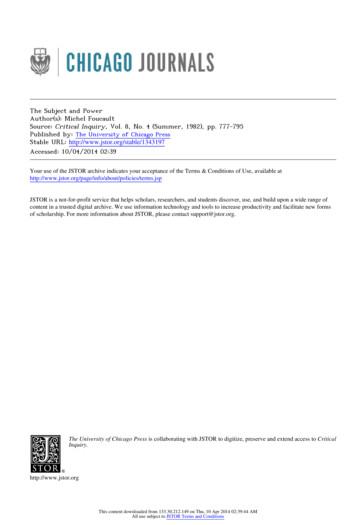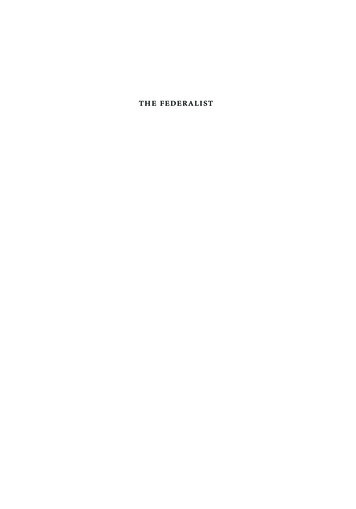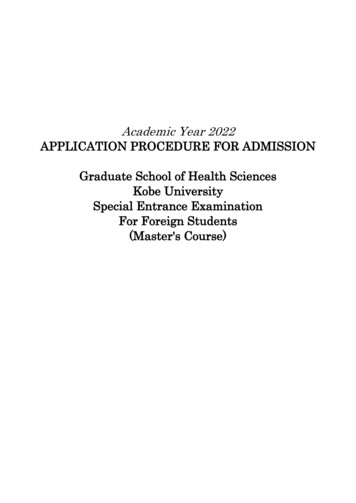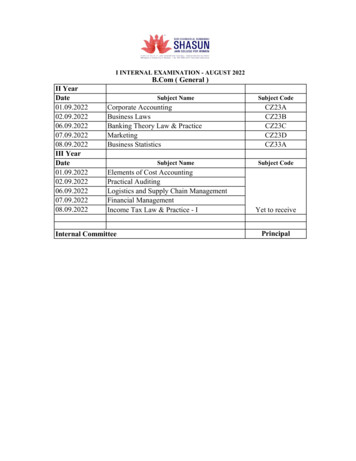
Transcription
The Subject and PowerAuthor(s): Michel FoucaultSource: Critical Inquiry, Vol. 8, No. 4 (Summer, 1982), pp. 777-795Published by: The University of Chicago PressStable URL: http://www.jstor.org/stable/1343197 .Accessed: 10/04/2014 02:39Your use of the JSTOR archive indicates your acceptance of the Terms & Conditions of Use, available at ms.jsp.JSTOR is a not-for-profit service that helps scholars, researchers, and students discover, use, and build upon a wide range ofcontent in a trusted digital archive. We use information technology and tools to increase productivity and facilitate new formsof scholarship. For more information about JSTOR, please contact support@jstor.org.The University of Chicago Press is collaborating with JSTOR to digitize, preserve and extend access to CriticalInquiry.http://www.jstor.orgThis content downloaded from 133.30.212.149 on Thu, 10 Apr 2014 02:39:44 AMAll use subject to JSTOR Terms and Conditions
The Subject and PowerMichel FoucaultWhy Study Power? The Question of the SubjectThe ideas which I would like to discuss here represent neither a theorynor a methodology.I would like to say, first of all, what has been the goal of my workduring the last twenty years. It has not been to analyze the phenomenaof power, nor to elaborate the foundations of such an analysis.My objective, instead, has been to create a history of the differentmodes by which, in our culture, human beings are made subjects. Mywork has dealt with three modes of objectification which transformhuman beings into subjects.The first is the modes of inquiry which try to give themselves thestatus of sciences; for example, the objectivizing of the speaking subjectin grammaire generale, philology, and linguistics. Or again, in this firstmode, the objectivizing of the productive subject, the subject who labors,in the analysis of wealth and of economics. Or, a third example, theobjectivizing of the sheer fact of being alive in natural history or biology.In the second part of my work, I have studied the objectivizing ofthe subject in what I shall call "dividing practices." The subject is eitherThis essay was written by Michel Foucault as an afterword to Michel Foucault: BeyondStructuralismand Hermeneuticsby Hubert L. Dreyfus and Paul Rabinow and reprinted byarrangement with the University of Chicago Press. "Why Study Power? The Question ofthe Subject" was written in English by Foucault; "How Is Power Exercised?" was translatedfrom the French by Leslie Sawyer.Critical Inqury 8 (Summer 1982), 1982 by The Uni ersity of Chicago. 0093-1896/82/0804-0006 01.00.All rights reserved.777This content downloaded from 133.30.212.149 on Thu, 10 Apr 2014 02:39:44 AMAll use subject to JSTOR Terms and Conditions
778Michel FoucaultThe Subjectand Powerdivided inside himself or divided from others. This process objectivizeshim. Examples are the mad and the sane, the sick and the healthy, thecriminals and the "good boys."Finally, I have sought to study-it is my current work-the way ahuman being turns himself into a subject. For example, I have chosenthe domain of sexuality-how men have learned to recognize themselvesas subjects of "sexuality."Thus, it is not power but the subject which is the general theme ofmy research.It is true that I became quite involved with the question of power. Itsoon appeared to me that, while the human subject is placed in relationsof production and of signification, he is equally placed in power relationswhich are very complex. Now, it seemed to me that economic history andtheory provided a good instrument for relations of production and thatlinguistics and semiotics offered instruments for studying relations ofsignification; but for power relations we had no tools of study. We hadrecourse only to ways of thinking about power based on legal models,that is: What legitimates power? Or, we had recourse to ways of thinkingabout power based on institutional models, that is: What is the state?It was therefore necessary to expand the dimensions of a definitionof power if one wanted to use this definition in studying the objectivizingof the subject.Do we need a theory of power? Since a theory assumes a priorobjectification, it cannot be asserted as a basis for analytical work. Butthis analytical work cannot proceed without an ongoing conceptualization. And this conceptualization implies critical thought-a constantchecking.The first thing to check is what I shall call the "conceptual needs." Imean that the conceptualization should not be founded on a theory ofthe object-the conceptualized object is not the single criterion of a goodconceptualization. We have to know the historical conditions whichmotivate our conceptualization. We need a historical awareness of ourpresent circumstance.The second thing to check is the type of reality with which we aredealing.A writer in a well-known French newspaper once expressed hissurprise: "Why is the notion of power raised by so many people today? IsMichel Foucault has been teaching at the College de France since1970. His works include Madness and Civilization (1961), The Birth ofthe Clinic (1966), Discipline and Punish (1975), and History of Sexuality(1976), the first volume of a projected five-volume study.This content downloaded from 133.30.212.149 on Thu, 10 Apr 2014 02:39:44 AMAll use subject to JSTOR Terms and Conditions
Critical InquirySummer1982779it such an important subject? Is it so independent that it can be discussedwithout taking into account other problems?"This writer's surprise amazes me. I feel skeptical about the assumption that this question has been raised for the first time in the twentiethcentury. Anyway, for us it is not only a theoretical question but a part ofour experience. I'd like to mention only two "pathological forms"-thosetwo "diseases of power"-fascism and Stalinism. One of the numerousreasons why they are, for us, so puzzling is that in spite of their historicaluniqueness they are not quite original. They used and extended mechanisms already present in most other societies. More than that: in spite oftheir own internal madness, they used to a large extent the ideas and thedevices of our political rationality.What we need is a new economy of power relations-the word "economy" being used in its theoretical and practical sense. To put it in otherwords: since Kant, the role of philosophy is to prevent reason fromgoing beyond the limits of what is given in experience; but from thesame moment-that is, since the development of the modern state andthe political management of society-the role of philosophy is also tokeep watch over the excessive powers of political rationality, which is arather high expectation.Everybody is aware of such banal facts. But the fact that they'rebanal does not mean they don't exist. What we have to do with banalfacts is to discover-or try to discover-which specific and perhapsoriginal problem is connected with them.The relationship between rationalization and excesses of politicalpower is evident. And we should not need to wait for bureaucracy orconcentration camps to recognize the existence of such relations. But theproblem is: What to do with such an evident fact?Shall we try reason? To my mind, nothing would be more sterile.First, because the field has nothing to do with guilt or innocence. Second,because it is senseless to refer to reason as the contrary entity to nonreason. Last, because such a trial would trap us into playing the arbitrary and boring part of either the rationalist or the irrationalist.Shall we investigate this kind of rationalism which seems to bespecific to our modern culture and which originates in Aufkldrung? Ithink that was the approach of some of the members of the FrankfurtSchool. My purpose, however, is not to start a discussion of their works,although they are most important and valuable. Rather, I would suggestanother way of investigating the links between rationalization andpower.It may be wise not to take as a whole the rationalization of society orof culture but to analyze such a process in several fields, each with reference to a fundamental experience: madness, illness, death, crime, sexuality, and so forth.I think that the word "rationalization" is dangerous. What we haveThis content downloaded from 133.30.212.149 on Thu, 10 Apr 2014 02:39:44 AMAll use subject to JSTOR Terms and Conditions
780Michel FoucaultThe Subjectand Powerto do is analyze specific rationalities rather than always invoke the progress of rationalization in general.Even if the Aufkliirung has been a very important phase in our history and in the development of political technology, I think we have torefer to much more remote processes if we want to understand how wehave been trapped in our own history.I would like to suggest another way to go further toward a neweconomy of power relations, a way which is more empirical, more directly related to our present situation, and which implies more relationsbetween theory and practice. It consists of taking the forms of resistanceagainst different forms of power as a starting point. To use anothermetaphor, it consists of using this resistance as a chemical catalyst so as tobring to light power relations, locate their position, and find out theirpoint of application and the methods used. Rather than analyzing powerfrom the point of view of its internal rationality, it consists of analyzingpower relations through the antagonism of strategies.For example, to find out what our society means by sanity, perhapswe should investigate what is happening in the field of insanity.And what we mean by legality in the field of illegality.And, in order to understand what power relations are about,perhaps we should investigate the forms of resistance and attemptsmade to dissociate these relations.As a starting point, let us take a series of oppositions which havedeveloped over the last few years: opposition to the power of men overwomen, of parents over children, of psychiatry over the mentally ill, ofmedicine over the population, of administration over the ways peoplelive.It is not enough to say that these are anti-authority struggles; wemust try to define more precisely what they have in common.1. They are "transversal" struggles; that is, they are not limited toone country. Of course, they develop more easily and to a greater extentin certain countries, but they are not confined to a particular political oreconomic form of government.2. The aim of these struggles is the power effects as such. For example, the medical profession is not criticized primarily because it is aprofit-making concern but because it exercises an uncontrolled powerover people's bodies, their health, and their life and death.3. These are "immediate" struggles for two reasons. In such struggles people criticize instances of power which are the closest to them,those which exercise their action on individuals. They do not look for the"chief enemy" but for the immediate enemy. Nor do they expect to finda solution to their problem at a future date (that is, liberations, revolutions, end of class struggle). In comparison with a theoretical scale ofexplanations or a revolutionary order which polarizes the historian, theyare anarchistic struggles.This content downloaded from 133.30.212.149 on Thu, 10 Apr 2014 02:39:44 AMAll use subject to JSTOR Terms and Conditions
Critical InquirySummer1982781But these are not their most original points. The following seem tome to be more specific.4. They are struggles which question the status of the individual: onthe one hand, they assert the right to be different, and they underlineeverything which makes individuals truly individual. On the other hand,they attack everything which separates the individual, breaks his linkswith others, splits up community life, forces the individual back on himself, and ties him to his own identity in a constraining way.These struggles are not exactly for or against the "individual" butrather they are struggles against the "government of individualization."5. They are an opposition to the effects of power which are linkedwith knowledge, competence, and qualification: struggles against theprivileges of knowledge. But they are also an opposition against secrecy,deformation, and mystifying representations imposed on people.There is nothing "scientistic" in this (that is, a dogmatic belief in thevalue of scientific knowledge), but neither is it a skeptical or relativisticrefusal of all verified truth. What is questioned is the way in whichknowledge circulates and functions, its relations to power. In short, theregime du savoir.6. Finally, all these present struggles revolve around the question:Who are we? They are a refusal of these abstractions, of economic andideological state violence, which ignore who we are individually, and alsoa refusal of a scientific or administrative inquisition which determineswho one is.To sum up, the main objective of these struggles is to attack not somuch "such or such" an institution of power, or group, or elite, or classbut rather a technique, a form of power.This form of power applies itself to immediate everyday life whichcategorizes the individual, marks him by his own individuality, attacheshim to his own identity, imposes a law of truth on him which he mustrecognize and which others have to recognize in him. It is a form ofpower which makes individuals subjects. There are two meanings of theword "subject": subject to someone else by control and dependence; andtied to his own identity by a conscience or self-knowledge. Both meanings suggest a form of power which subjugates and makes subject to.Generally, it can be said that there are three types of struggles:either against forms of domination (ethnic, social, and religious); againstforms of exploitation which separate individuals from what they produce; or against that which ties the individual to himself and submits himto others in this way (struggles against subjection, against forms of subjectivity and submission).I think that in history you can find a lot of examples of these threekinds of social struggles, either isolated from each other or mixed together. But even when they are mixed, one of them, most of the time,prevails. For instance, in the feudal societies, the struggles against theThis content downloaded from 133.30.212.149 on Thu, 10 Apr 2014 02:39:44 AMAll use subject to JSTOR Terms and Conditions
782Michel FoucaultThe Subjectand Powerforms of ethnic or social domination were prevalent, even though economic exploitation could have been very important among the revolt'scauses.In the nineteenth century, the struggle against exploitation cameinto the foreground.And nowadays, the struggle against the forms of subjectionagainst the submission of subjectivity-is becoming more and more important, even though the struggles against forms of domination andexploitation have not disappeared. Quite the contrary.I suspect that it is not the first time that our society has been confronted with this kind of struggle. All those movements which took placein the fifteenth and sixteenth centuries and which had the Reformationas their main expression and result should be analyzed as a great crisis ofthe Western experience of subjectivity and a revolt against the kind ofreligious and moral power which gave form, during the Middle Ages, tothis subjectivity. The need to take a direct part in spiritual life, in thework of salvation, in the truth which lies in the Book-all that was astruggle for a new subjectivity.I know what objections can be made. We can say that all types ofsubjection are derived phenomena, that they are merely the consequences of other economic and social processes: forces of production,class struggle, and ideological structures which determine the form ofsubjectivity.It is certain that the mechanisms of subjection cannot be studiedoutside their relation to the mechanisms of exploitation and domination.But they do not merely constitute the "terminal" of more fundamentalmechanisms. They entertain complex and circular relations with otherforms.The reason this kind of struggle tends to prevail in our society is dueto the fact that, since the sixteenth century, a new political form of powerhas been continuously developing. This new political structure, as everybody knows, is the state. But most of the time, the state is envisioned as akind of political power which ignores individuals, looking only at theinterests of the totality or, I should say, of a class or a group among thecitizens.That's quite true. But I'd like to underline the fact that the state'spower (and that's one of the reasons for its strength) is both an individualizing and a totalizing form of power. Never, I think, in the history ofhuman societies--even in the old Chinese society-has there been such atricky combination in the same political structures of individualizationtechniques and of totalization procedures.This is due to the fact that the modern Western state has integratedin a new political shape an old power technique which originated inChristian institutions. We can call this power technique the pastoralpower.This content downloaded from 133.30.212.149 on Thu, 10 Apr 2014 02:39:44 AMAll use subject to JSTOR Terms and Conditions
Critical InquirySummer1982783First of all, a few words about this pastoral power.It has often been said that Christianity brought into being a code ofethics fundamentally different from that of the ancient world. Less emphasis is usually placed on the fact that it proposed and spread newpower relations throughout the ancient world.Christianity is the only religion which has organized itself as achurch. And as such, it postulates in principle that certain individualscan, by their religious quality, serve others not as princes, magistrates,prophets, fortune-tellers, benefactors, educationalists, and so on but aspastors. However, this word designates a very special form of power.1. It is a form of power whose ultimate aim is to assure individualsalvation in the next world.2. Pastoral power is not merely a form of power which commands; itmust also be prepared to sacrifice itself for the life and salvation of theflock. Therefore, it is different from royal power, which demands asacrifice from its subjects to save the throne.3. It is a form of power which does not look after just the wholecommunity but each individual in particular, during his entire life.4. Finally, this form of power cannot be exercised without knowingthe inside of people's minds, without exploring their souls, withoutmaking them reveal their innermost secrets. It implies a knowledge ofthe conscience and an ability to direct it.This form of power is salvation oriented (as opposed to politicalpower). It is oblative (as opposed to the principle of sovereignty); it isindividualizing (as opposed to legal power); it is coextensive and continuous with life; it is linked with a production of truth-the truth of theindividual himself.But all this is part of history, you will say; the pastorate has, if notdisappeared, at least lost the main part of its efficiency.This is true, but I think we should distinguish between two aspectsof pastoral power-between the ecclesiastical institutionalization, whichhas ceased or at least lost its vitality since the eighteenth century, and itsfunction, which has spread and multiplied outside the ecclesiastical institution.An important phenomenon took place around the eighteenthcentury-it was a new distribution, a new organization of this kind ofindividualizing power.I don't think that we should consider the "modern state" as an entitywhich was developed above individuals, ignoring what they are and eventheir very existence, but, on the contrary, as a very sophisticated structure, in which individuals can be integrated, under one condition: thatthis individuality would be shaped in a new form and submitted to a setof very specific patterns.In a way, we can see the state as a modern matrix of individualization or a new form of pastoral power.This content downloaded from 133.30.212.149 on Thu, 10 Apr 2014 02:39:44 AMAll use subject to JSTOR Terms and Conditions
784Michel FoucaultThe Subjectand PowerA few more words about this new pastoral power.1. We may observe a change in its objective. It was no longer aquestion of leading people to their salvation in the next world but ratherensuring it in this world. And in this context, the word "salvation" takeson different meanings: health, well-being (that is, sufficient wealth,standard of living), security, protection against accidents. A series of"worldly" aims took the place of the religious aims of the traditionalpastorate, all the more easily because the latter, for various reasons, hadfollowed in an accessory way a certain number of these aims; we onlyhave to think of the role of medicine and its welfare function assured fora long time by the Catholic and Protestant churches.2. Concurrently the officials of pastoral power increased. Sometimesthis form of power was exerted by state apparatus or, in any case, by apublic institution such as the police. (We should not forget that in theeighteenth century the police force was not invented only for maintaining law and order, nor for assisting governments in their struggle againsttheir enemies, but for assuring urban supplies, hygiene, health, andstandards considered necessary for handicrafts and commerce.) Sometimes the power was exercised by private ventures, welfare societies,benefactors, and generally by philanthropists. But ancient institutions,for example the family, were also mobilized at this time to take onpastoral functions. It was also exercised by complex structures such asmedicine, which included private initiatives with the sale of services onmarket economy principles, but which also included public institutionssuch as hospitals.3. Finally, the multiplication of the aims and agents of pastoralpower focused the development of knowledge of man around two roles:one, globalizing and quantitative, concerning the population; the other,analytical, concerning the individual.And this implies that power of a pastoral type, which over centuries-for more than a millennium-had been linked to a defined religious institution, suddenly spread out into the whole social body; itfound support in a multitude of institutions. And, instead of a pastoralpower and a political power, more or less linked to each other, more orless rival, there was an individualizing "tactic" which characterized aseries of powers: those of the family, medicine, psychiatry, education,and employers.At the end of' the eighteenth century, Kant wrote, in a Germannewspaper-the Berliner Monatschrift-a short text. The title was "Washeisst Aufklairung?" It was for a long time, and it is still, considered awork of relatively small importance.But I can't help finding it very interesting and puzzling because itwas the first time a philosopher proposed as a philosophical task toinvestigate not only the metaphysical system or the foundations of sci-This content downloaded from 133.30.212.149 on Thu, 10 Apr 2014 02:39:44 AMAll use subject to JSTOR Terms and Conditions
Critical InquirySummer1982785entific knowledge but a historical event-a recent, even a contemporaryevent.When in 1784 Kant asked, Was heisst Aufklirung?, he meant,What's going on just now? What's happening to us? What is this world,this period, this precise moment in which we are living?Or in other words: What are we? as Aufklidrer,as part of the Enlightenment? Compare this with the Cartesian question: Who am I? I, asa unique but universal and unhistorical subject? I, for Descartes, iseveryone, anywhere at any moment?But Kant asks something else: What are we? in a very precise moment of history. Kant's question appears as an analysis of both us andour present.I think that this aspect of philosophy took on more and more importance. Hegel, Nietzsche .The other aspect of "universal philosophy" didn't disappear. Butthe task of philosophy as a critical analysis of our world is somethingwhich is more and more important. Maybe the most certain of all philosophical problems is the problem of the present time and of what we arein this very moment.Maybe the target nowadays is not to discover what we are but torefuse what we are. We have to imagine and to build up what we couldbe to get rid of this kind of political "double bind," which is the simultaneous individualization and totalization of modern power structures.The conclusion would be that the political, ethical, social, philosophical problem of our days is not to try to liberate the individual fromthe state and from the state's institutions but to liberate us both from thestate and from the type of individualization which is linked to the state.We have to promote new forms of subjectivity through the refusal of thiskind of individuality which has been imposed on us for several centuries.How Is Power Exercised?For some people, asking questions about the "how" of power wouldlimit them to describing its effects without ever relating those effectseither to causes or to a basic nature. It would make this power a mysterious substance which they might hesitate to interrogate in itself, no doubtbecause they would prefer not to call it into question. By proceeding thisway, which is never explicitly justified, they seem to suspect the presenceof a kind of fatalism. But does not their very distrust indicate a presupposition that power is something which exists with three distinctqualities: its origin, its basic nature, and its manifestations?If, for the time being, I grant a certain privileged position to thequestion of "how," it is not because I would wish to eliminate the ques-This content downloaded from 133.30.212.149 on Thu, 10 Apr 2014 02:39:44 AMAll use subject to JSTOR Terms and Conditions
786Michel FoucaultThe Subjectand Powertions of "what" and "why." Rather, it is that I wish to present thesequestions in a different way: better still, to know if it is legitimate toimagine a power which unites in itself a what, a why, and a how. To put itbluntly, I would say that to begin the analysis with a "how" is to suggestthat power as such does not exist. At the very least it is to ask oneselfwhat contents one has in mind when using this all-embracing and reifying term; it is to suspect that an extremely complex configuration ofrealities is allowed to escape when one treads endlessly in the doublequestion: What is power? and Where does power come from? The littlequestion, What happens?, although flat and empirical, once scrutinized isseen to avoid accusing a metaphysics or an ontology of power of beingfraudulent; rather, it attempts a critical investigation into the thematicsof power."How," not in the sense oJ "How does it manifest itself?" but "By whatmeans is it exercised?"and "Whathappens when individuals exert(as theysay)power over others?"As far as this power is concerned, it is first necessary to distinguishthat which is exerted over things and gives the ability to modify, use,consume, or destroy them-a power which stems from aptitudes directlyinherent in the body or relayed by external instruments. Let us say thathere it is a question of "capacity." On the other hand, what characterizesthe power we are analyzing is that it brings into play relations betweenindividuals (or between groups). For let us not deceive ourselves; if wespeak of the structures or the mechanisms of power, it is only insofar aswe suppose that certain persons exercise power over others. The term"power" designates relationships between partners (and by that I am notthinking of a zero-sum game but simply, and for the moment staying inthe most general terms, of an ensemble of actions which induce othersand follow from one another).It is necessary also to distinguish power relations from relationshipsof communication which transmit information by means of a language, asystem of signs, or any other symbolic medium. No doubt communicating is always a certain way of acting upon another person or persons. Butthe production and circulation of elements of meaning can have as theirobjective or as their consequence certain results in the realm of power;the latter are not simply an aspect of the former. Whether or not theypass through systems of communication, power relations have a specificnature. Power relations, relationships of communication, and objectivecapacities should not therefore be confused. This is not to say that thereis a question of three separate domains. Nor that there is on one handthe field of things, of perfected technique, work, and the transformationof the real; on the other that of signs, communication, reciprocity, andthe production of meaning; and finally, that of the domination of theThis content downloaded from 133.30.212.149 on Thu, 10 Apr 2014 02:39:44 AMAll use subject to JSTOR Terms and Conditions
Critical InquirySummer1982787means of constraint, of inequality, and the action of men upon othermen.' It is a question of three types of relationships which in fact alwaysoverlap one another, support one another reciprocally, and use eachother mutually as means to an end. The application of objectivecapacities in their most elementary forms implies relationships of communication (whether in the form of previously acquired information orof shared work); it is tied also to power relations (whether they consist ofobligatory tasks, of gestures imposed by tradition or apprenticeship, ofsubdivisions and the more or less obligatory distribution of labor). Relationships of communication imply finalized activities (even if only thecorrect putting into operation of elements of meaning) and, by virtue ofmodifying the field of information between partners, produce effects ofpower. They can scarcely be dissociated from activities brought to theirfinal term, be they those which per
The Subject and Power Author(s): Michel Foucault Source: Critical Inquiry, Vol. 8, No. 4 (Summer, 1982), pp. 777-795 Published by: The University of Chicago Press . To my mind, nothing would be more sterile. First, because the field has nothing to do with guilt or innocence. Second,










